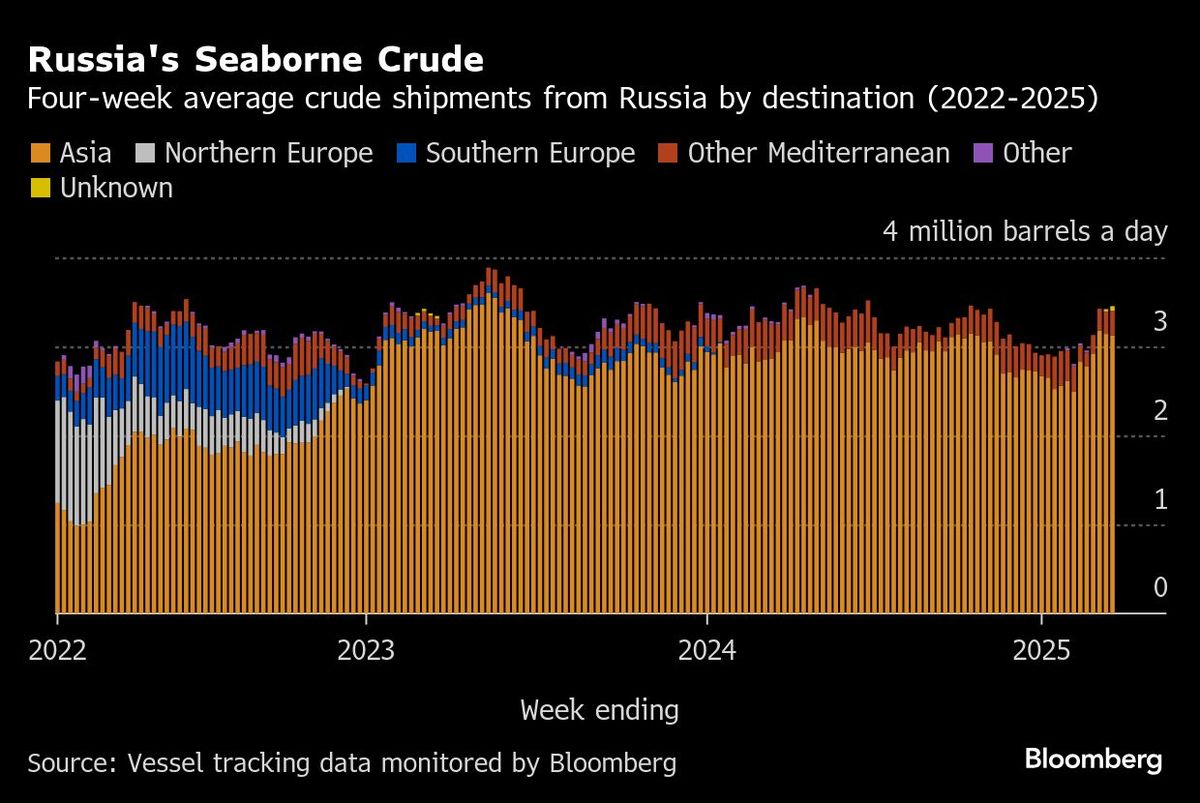
(March 31): US President Donald Trump said he is considering “secondary tariffs” on Russian oil if Vladimir Putin refuses a ceasefire with Ukraine, while saying he doesn’t think the Russian president will “go back on his word”.
Trump’s comments appeared to take some of the edge off his criticism earlier on Sunday, when NBC News reported him as saying he’s “pissed off” and “very angry” at Putin for casting doubt on Ukrainian President Volodymyr Zelenskiy’s legitimacy as a negotiating partner.
“I was disappointed in a certain way with some of the things that were said over the last day or two having to do with Zelenskiy because he considers Zelenskiy not credible,” Trump told reporters aboard Air Force One. “He’s supposed to be making a deal with him, whether you like him or don’t like him. So I wasn’t happy with that. But I think he’s going to be good.”
After telling NBC he would put “secondary sanctions” on Russian oil experts if he thought Putin was blocking a Ukraine deal, Trump told reporters “I certainly wouldn’t want to put secondary tariffs on Russia”.
Russia is one of the world’s three largest oil producers, meaning any attempt to punish purchases of Russian supplies could have a far-reaching effect on the oil market, and any disruptions could add to inflationary pressures.
India and China, which have become the key buyers of Russian barrels since Moscow’s full-scale invasion of Ukraine, would face particular pressure.
Trump told NBC if he can’t make “a deal on stopping the bloodshed in Ukraine, and if I think it was Russia’s fault — which it might not be — but if I think it was Russia’s fault, I am going to put secondary tariffs on oil”.
“That would be that if you buy oil from Russia, you can’t do business in the US,” he said. “There will be a 25% tariff on all — on all oil, a 25- to 50-point tariff on all oil.”
At the same time, Trump maintained pressure on Zelenskiy to agree to a deal to give the US access to Ukraine’s resources.
“He’s trying to back out of the rare earth deal and if he does that he’s got some problems — big, big problems,” Trump said. “If he’s looking to renegotiate the deal, he’s got big problems.”
The US said last week that Ukraine and Russia had agreed to a Black Sea truce as the next stage in Trump’s efforts to end the war, following their acceptance of a 30-day halt to strikes on energy infrastructure.
While Ukraine said it would immediately observe the ceasefire, the Kremlin demanded the removal of sanctions on Russian Agricultural Bank, or RSHB, and other financial institutions involved in foreign trade in food and fertilisers.
Russian crude exports hit a five-month high in March and US sanctions on Russia’s oil tanker fleet are showing signs of faltering.
Trump’s threat “should see prices reacting more strongly considering the volumes at risk”, said Giovanni Staunovo, a commodity analyst at UBS Group AG. “But so far there are no supply disruptions, just threats, and in the past it has taken real disruptions for prices to move higher on a sustained basis.”
Trump last week appeared to invent a new economic statecraft tactic by threatening secondary tariffs on countries that buy oil from Venezuela to choke off its oil trade with other nations.
The threat, confirmed in an executive order by Trump, said countries could face 25% tariffs on trade with the US if they purchase oil and gas from Venezuela, which is already under heavy US sanctions. The move was meant to pressure Venezuela for the “tens of thousands of high level, and other, criminals” that Trump said Venezuela has sent to the US.
Trump also said he’s considering punishing Iran with unspecified “secondary tariffs” and raised the threat of bombing Iran until it signs a deal that renounces nuclear weapons.
“If they don’t make a deal, there will be bombing,” NBC cited Trump as saying.
Trump told Iranian Supreme Leader Ali Khamenei in a recently delivered letter that his nation has a two-month deadline to reach a new nuclear accord, according to a person familiar with its content. Trump has previously suggested he could “go in militarily” if necessary to stop Iran from obtaining a nuclear weapon.
Iran told Trump in response to his overture that it won’t hold talks with his administration, though indirect communications with the US remain a possibility, President Masoud Pezeshkian said on Sunday.
Uploaded by Tham Yek Lee
- Malaysia's semicon firms brace for future US action after dodging tariffs
- Cover Story: Fatter dividends declared in FY2024 ahead of 2% dividend tax
- Microsoft pulls back on data centres from Chicago to Jakarta
- Cover Story: Companies that paid the most to Malaysia’s GLICs in 2024
- US emerges as biggest loser in markets from Trump’s tariffs
- France’s Macron urges EU companies to pause US investments
- Mayu Global, Tuju Setia, Iskandar Waterfront City, TNB, HHRG
- Russell hits bear market with small caps buffeted by tariff wave
- Oil slumps over 7% on Trump tariffs, Opec+ boosting output
- HHRG furniture unit seeks injunction to bar directors from accessing premises

